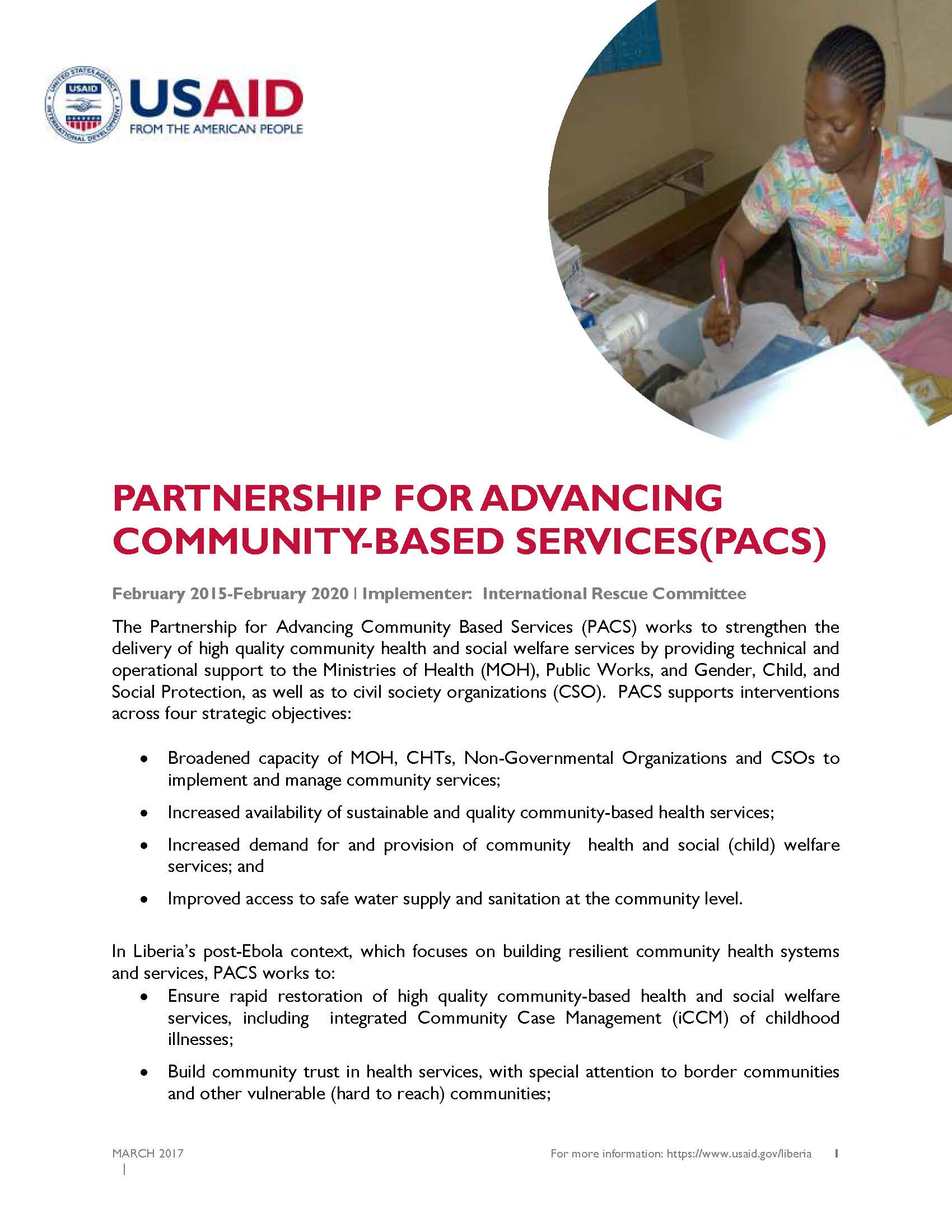Home » Partnership for Advancing Community-Based Services Fact Sheet
Speeches Shim
The Partnership for Advancing Community Based Services (PACS) works to strengthen the delivery of high quality community health and social welfare services by providing technical and operational support to the Ministries of Health (MOH), Public Works, and Gender, Child, and Social Protection, as well as to civil society organizations (CSO). PACS supports interventions across four strategic objectives:
- Broadened capacity of MOH, CHTs, Non-Governmental Organizations and CSOs to implement and manage community services;
- Increased availability of sustainable and quality community-based health services;
- Increased demand for and provision of community health and social (child) welfare services; and
- Improved access to safe water supply and sanitation at the community level.
In Liberia’s post-Ebola context, which focuses on building resilient community health systems and services, PACS works to:
- Ensure rapid restoration of high quality community-based health and social welfare services, including integrated Community Case Management (iCCM) of childhood illnesses;
- Build community trust in health services, with special attention to border communities and other vulnerable (hard to reach) communities;
- Strengthen community-level social mobilization and Water, Sanitation and Hygiene (WASH) structures
Current Activities
- Supporting the MOH to implement its revised Community Health Services Policy and Strategic Plan and deploy the new cadre of frontline community health service providers, Community Health Assistants (CHA), as well as Community Health Volunteers (CHVs)
- Supporting MOH social mobilization efforts in order to build trust and promote the utilization of essential services at health facilities and in communities
- Building the capacity of indigenous CSOs to design, implement, and manage quality community-based programs
Key Accomplishments
- Over 1,195 communities in the six counties declared Open Defecation free(ODF) and 815 retained ODF status for a year and certified
- Constructed 36 wells were and continue to be operational, serving approximately 9,000 individuals
- Completed organizational capacity assessments of key MOH Divisions (Community Health Services (CHS), National Health Promotion (NHP), and Environmental Health
- Developed performance improvement plans for CHS, NHP and Environmental Health divisions
- Trained general community health volunteers were on iCCM, immunization, and family planning in the six USAID focus counties. The gCHVs are providing community-based services with PACS support.
- Trained 99 Communty Health Services Supervsisors recruited 672 CHAs
- Developed a portfolio of Behavior Change Communications tools that address a range of different health priorities including maternal and child health, malaria prevention and treatment
- Developed data collection tools for the Community-Based Information System with PACS technical assistance
- Awarded sub-grants to nine local CSOs in the six counties to support their engagement with the MOH to i) ensure strong linkages and coordination between CHTs, District Health Teams, and communities; ii) stimulate community awareness; and iii) create demand for the use of health services.
- Integrated the Education Through Listening (ETL) approach to interpersonal communications for health promotion into the CHA training Curriculum.
- Developed and validated the National Health Communication Strategy was and 595 CHVs were trained in Education Through Listening Behaviour Change Communication
Planned Outcomes
- Greater capacity of government and CSOs to implement and manage community services
- Increased availability of community-based health and social welfare services
- Improved health-seeking behavior and practices
- Improved access to safe water, sanitation, and hygiene
Issuing Country
Date
Monday, April 17, 2017 - 11:15am


Comment
Make a general inquiry or suggest an improvement.